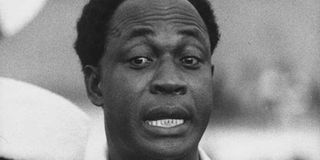AU Commission needs a chair who can stand up for Pan-African Ideals

Kwame Nkrumah. It was his endeavours that led to the founding of the Organisation of African Unity with the twin objective of anti-colonialism and continental unity. PHOTO | NATION MEDIA GROUP
What you need to know:
- Nkrumah rose to become the more committed pan-Africanist and his engagement with the diasporic pan-Africanists lasted longer and had greater traction.
- He was arguably also the leader of continental pan-Africanism, leading some of the early moves towards independence and continental unity.
Last week, I gave an endnote lecture at a conference organised by the Centre for Leadership Ethics in Africa of the University of Fort Hare in South Africa. Fort Hare is an historical university.
Its contribution in training nationalists who played a key role in the struggle for independence across Africa is notable.
Eliud Mathu, the first Kenyan African to join the Legislative Council in 1944 was educated at Fort Hare College.
Titled Out of One, Many Pan-Africanisms, the lecture traced the changing idea and practice of pan-Africanism from its diasporic moorings to the recent times of the African Renaissance project of Thabo Mbeki.
Has pan-Africanism responded adequately to transformations occurring in Africa and its diaspora and the new challenges these have unleashed?
Though the answer to this question is negative, there still remains hope for those optimistic enough to vision a better future for the continent.
Historic pan-Africanism was never a monologue. But even though protagonists conflicted on many issues, they were united by the desire to improve the situation of black folk in the world.
The debates between W.E.B. Du Bois, Marcus Garvey and Booker T. Washington assumed black people were important; the debate was about the best means to improve their situation.
Heated and dismissive as the debates were, there was never a doubt about their concern for Africa and Africans.
Edward Blyden invoked the idea of the African personality to emphasise racial pride, a notion that Kwame Nkrumah reframed to emphasize its triple heritage.
The importance of Nkrumah cannot be understood outside the training and engagement with George Padmore and CLR James.
Both believed in a radical anti-imperialist tradition. They represent the bridge between diasporic and continental pan-Africanism.
They got Nkrumah and Jomo Kenyatta as joint secretaries to the 1945 Pan-African Conference in Manchester.
Nkrumah rose to become the more committed pan-Africanist and his engagement with the diasporic pan-Africanists lasted longer and had greater traction.
He was arguably also the leader of continental pan-Africanism, leading some of the early moves towards independence and continental unity.
COMMITMENT TO AFRICA
It was his endeavours that led to the founding of the Organisation of African Unity with the twin objective of anti-colonialism and continental unity.
The first objective was largely attained with the end of apartheid in 1994 but the second has remained an elusive target.
The desire for continental unity remains a dream; nothing in the framework of the OAU helped advance this objective.
Julius Nyerere later acknowledged that those who favoured a gradualist approach to continental unity forgot that everyday Africa lived, the enemies of continental unity multiplied.
He was referring to the forces of balkanisation and the intense move to what he characterised as ‘exclusive nationalism’.
For him, exclusive nationalism is narrow and chauvinist; it responds less to the ideal of pan-Africanism and more to narrow nationalistic or tribal impulses.
The only moment when the continent attempted to surpass exclusive nationalism was in Thabo Mbeki’s idea of African Renaissance.
Thanks to a new book, The Thabo Mbeki I Know, edited by Sifiso Mxolisi Ndlovu and Miranda Strydom, we know what motivated him.
Mbeki, alongside a few other leaders, were driven by a commitment to Africa, almost seeming to reincarnate the pride embodied in the notion of African personality.
We cannot judge them harshly having spent decades with leaders who were driven by nothing but their egos and greed.
I reiterate this history because the AU is seeking to appoint a new chairman of the Commission in Addis Ababa.
Kenyan Cabinet minister Amina Mohamed has been nominated for the position.
She will be running against other candidates, among who the new addition is Prof Abdoulaye Bathily from Senegal.
Ultimately, what matters in the selection of the new AUC chair is not the citizenship of the nominee, it is the pan-Africanist vision that the appointee embodies.
Godwin R. Murunga is a senior research fellow in the Institute for Development Studies, University of Nairobi. [email protected]





